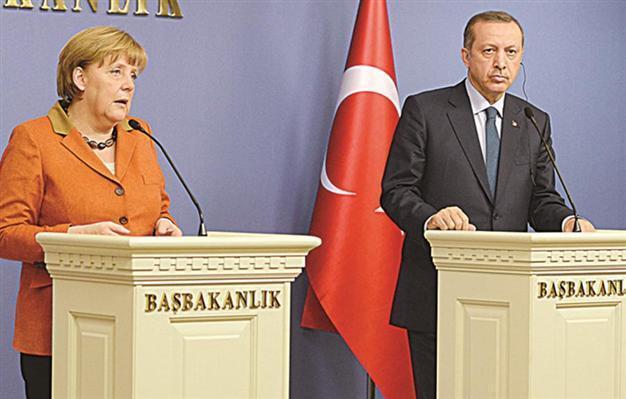Merkel, Erdoğan duel over Cyprus for EU bid
ANKARA

Visiting German Chancellor Merkel (L) holds a joint press conference with Turkish PM Erdoğan after their talks in Ankara. Merkel reiterates that she is hesitant on Turkey’s full membership in the 27-nation European Union. DAILY NEWS photo/ Selahattin SÖNMEZ
German Chancellor Angela Merkel expressed support yesterday for reviving Turkey’s flagging EU talks yet butted heads with Ankara on the deadlock surrounding Cyprus.“We need Turkey’s progress on the implementation of the Ankara protocol. Otherwise, the number of negotiation chapters that can be opened will be limited,” Merkel said alongside Prime Minister Recep Tayyip Erdoğan, but the latter said Ankara wanted to suspend the protocol until an embargo was lifted on Turkish Cyprus. Merkel also called for greater freedom for journalists and religious groups in Turkey.
Merkel reiterated that although she was hesitating on Turkey’s full membership in the EU, Germany wanted Turkey to continue its negotiations with the union.
If one chapter could be opened at the moment, that would be a step, Merkel said. Asked if Turkey would implement the Ankara protocol following the elections in Greek Cyprus, Erdoğan said the two issues were different.
Turkey would like to contribute to a solution in Cyprus if the new leader of Greek Cyprus, Nicos Anastasiades, is agreeable to such a move, Erdoğan said. “Of course, there is Greece’s responsibility as well.” The Ankara protocol must be adopted in Parliament to take effect, Erdoğan said, adding that Turkey had taken some steps in line with this understanding but had not yet secured an end to the embargo on northern Cyprus.
“Turkey wants to make an agreement with all EU member states in the framework of goodwill and is willing to boost trade with them,” he said.
EU member states decided in 2006 not to open eight chapters in Turkey’s accession negotiations and suspended the conclusion of the remaining chapters in process on the grounds that Turkey had failed to fulfill its responsibilities stemming from the “Additional Protocol” to the Association Agreement, which, Brussels says, stipulates that Turkey must open its ports and airports to Greek Cypriot ships and planes. In response to the EU, Turkey says the EU should first end its blockade of Turkish Cyprus. Erdoğan thanked Merkel for the German Patriot systems deployed in Turkey as part of NATO cooperation. “We care about the support to Turkey in the context of NATO. Turkey has been a reliable partner for Germany since Cold War times,” Merkel said.
Germany wants religious groups to be able to practice their activities freely in Turkey, in Germany and everywhere, she said, adding that she would meet with representatives of religious groups in Ankara. “I’ll do my best to clarify National Socialist Underground killings,” Merkel also said in reference to the group that killed eight Turks and two others in a series of racist murders.
Merkel said she also discussed the new judicial package with Erdoğan. “I told him that we want journalists to work freely in Turkey and that there be shorter periods of detention. Mr. Erdoğan offered cooperation with us. We’ll be in contact about rough justice,” she said.
Issue of jailed journalists
Asked about jailed journalists in Turkey, Erdoğan reiterated the Turkish government’s stance that the number of arrested journalists due to their journalistic activities did not exceed “the number of fingers on one hand.” The reason journalists have been arrested is not their articles, but “attempts to stage a coup … keeping illegal arms, or being a member of terrorist movement.” He also said Turkey’s judiciary was independent, as it is in Germany. “The judiciary is not subordinate to the executive,” Erdoğan said.
Earlier in the day, Merkel held a meeting with President Abdullah Gül during which the latter underlined the importance of the continuation of Germany’s support for Turkey’s EU entry within the framework of the “pacta sunt servanda” (agreements must be kept) principle, according to a statement posted on the webpage of the Turkish presidency.
For her part, Merkel told Gül that the multidimensional relations between the two countries had been diversifying each day on the basis of friendship and their long-held alliance.
















